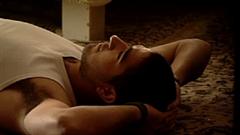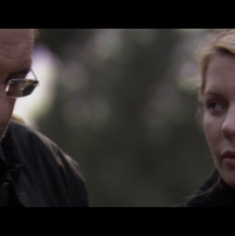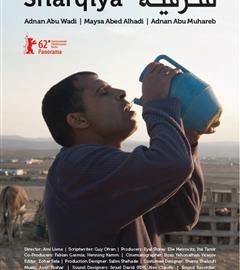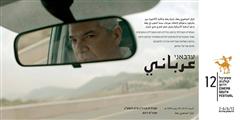Like any devout Muslim, Maor goes to the mosque, studies the Qu’ran, and prays towards Mecca five times a day. But there’s something which sets Maor apart – she was born May Davidovich, to a Jewish family in a small Israeli town called Karmiel, and converted to Islam when she was 18 years old. Mom, Dad, I’m a Muslim picks up four years later, when Maor has begun to look for a husband who’s observant of her adopted faith. This informal domestic portrait illustrates Maor’s plight of being torn between two worlds, longing to find a place in the Arab community while dealing with the shunning she faces from her own. Maor and her family’s journey towards a new synthesis, illustrated in humble everyday moments, is a testament to the triumph of human values over institutional walls.
Archives

77 Steps
This is the personal journey of the director who leaves her Arab-Muslim village and moves to Tel Aviv. While searching for an apartment, she encounters discrimination by most landlords because of her Arab origins. She finally finds an apartment, and meets her neighbor – Jonathan, a Jewish-Canadian man who immigrated to Israel. A love story ensues. Ibtisam joins a left-wing political party (Meretz) and runs for the Knesset. On New Year’s Eve 2009, Israel invades Gaza. Hundreds are killed. Ibtisam resigns from her party because of its support of the War. She struggles over her Palestinian identity, but does not relinquish her relationship with Jonathan. Yet something has gone sour. Jonathan’s family refuses to meet his girlfriend. Jonathan says: “They can’t forgo their image of their future daughter-in-law – Jewish, white and English-speaking.” Ibtisam is also unable to reveal her relationship to her mother. One day, Jonathan’s grandfather comes from Canada on a nostalgic trip to Kibbutz Ein-Dor, which he helped found in 1948. Ibtisam and Jonathan join him. It becomes an individual journey for each one of them – one that takes them back in time and into the unknown, to memories and dreams, Nakba and independence, love and hate, longing and loss.

Transit
Transit begins and ends in an airport during a father and son’s transit flight from Tel Aviv to Manila. It tells the story of Moises, a Filipino single-dad working as a caregiver in Herzliya, Israel, who comes home to his son Joshua’s 4th birthday. It was on that day that Moises, together with their Filipino neighbors, Janet and her daughter Yael, find out that the Israeli government is going to deport children of foreign workers. Afraid of the new law, Moises and Janet decide to hide their children from the immigration police by making them stay inside the house.
It’s Better to Jump
The Northern port city of Acco (Acre) is a mixed (Jewish-Arab) city. The city’s Palestinian population—both Muslim and Christian, and for the large part “Palestinians of 1948,” who were the residents of Israel when it was granted statehood—has been there for generations. As Acco has become an increasingly-popular tourist destination, however, there has been a concerted push to change the long-standing demographics, resulting in a government-backed push to move Palestinians out of the Old City. In the hands of the filmmakers, a traditional rite of passage in Acco, the act of jumping from the ancient 40-foot seawall, becomes a metaphor for the perilous situation and great bravery of the city’s Palestinian population. A tough, deeply empathetic film that may suggest uneasy parallels between subtler gentrification, as we know it, and actual forced relocation.

Ameer Got His Gun
Unlike the majority of 18 year old boys in Israel, for whom army service is mandatory, Ameer is exempt from military service under the assumption that his enlistment might endanger Israel’s security. That is because Ameer, An Israeli citizen, is a Muslim Arab. And yet, Ameer decides to volunteer. He believes that his induction is the way to equality, he believes this is the way to belong to the state he lives in, the state he wants to love. Ameer is setting a voyage to civic and self definition, while carefully navigating the thin line between Jewish and Arab societies. Being an eternal optimist Ameer wishes to be both a proud Arab and enthusiastic Israeli while his only enemy is reality.

Naomi
Ilan, an astrophysics professor, is married to the younger and very beautiful Naomi. One day, he finds out that his wife has a lover… A film about guilt, love and unlimited devotion. Based on the best-selling novel by Edna Mazya, one of Israel’s most successful playwrights.

Sharqiya
No one really appreciates Kamel Nadjer, the young Bedouin security guard at the Be’er Sheba central bus station, neither his family, nor his Israeli colleagues. When the poor tin shacks he shares with his family in the desert are menaced by demolition orders, Kamel decides to take action. He will stage a bombing in the bus station and then prevent it, in order to establish himself as a hero, save his village, and win the admiration he so desires.

Arabani
Yoseph returns to his native Druze village after 17 years with his son and daughter, whose Jewish mother he has divorced, and plans to settle down. This leads to friction within the closed conservative Druze community. Despite the problems and difficulties, Semadar, Yoseph’s daughter, unexpectedly finds love.

Almost Friends
Two girls meet online. Samar, 12, has an Arab Israeli mother and a Palestinian father from the Occupied Territories. She lives in Lod, a mixed city marred by poverty and crime. Linor, 11, was born in Gush Katif in the Gaza Strip but now lives in Tlamim, a religious settlement in the Lachish region. Only 67 km separate Lod and Tlamim, but the girls are also separated by a vast national, cultural and ideological abyss. As participants in a program combining education and technology, their relationship starts from online correspondence. Meeting face-to-face adds an exciting, tense and often surprising component to the two girls’ lives, sweeping them and their families into a profound and complex experience.
Arabic Movie
A look back at that old Friday afternoon ritual, when Israeli families of all backgrounds would watch the Arab movie of the week. Arabic Movie takes us back to that fleeting moment when Israelis shared the same cultural heroes as everyone else in the Middle East, even as it raises disturbing questions about the relationship of Israelis with their neighbors across the border.
